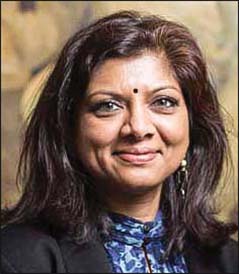IN MY OPINION
Ambassadors for Hinduism
As Hindus, our ability to articulately explain our faith to others is of utmost importance in today’s world
BY PADMA KUPPA
imageWE LIVE IN CHALLENGING times, when ignorance about one’s neighbor can lead to not just “otherizing” them, but also to fear, distrust and even violence towards those with beliefs and practices that seem alien to one’s own.
When I moved to Michigan, US, nearly two decades ago, I was one of a handful of people called upon in response to requests from schools, colleges and other groups for a Hindu representative. In 2006, as a result of this increasing stream of requests, our temple formed an outreach committee with a mission to represent Hindus in interfaith and community activities. Ten years later, our committee continues to fulfill its mission, but the critical nature of its purpose is not fully grasped by our community.
Beyond responding to explicit requests for speakers, we face a larger challenge: to ensure that the Hindu community is better prepared for the ever-increasing number of non-Hindu guests. The need for outreach has multiplied, but the basic challenge for Hindus in the US remains: we are often not able to articulate our faith in a way that dispels stereotypes and reduces child bullying.
Hinduism is not a faith that holds propagation as a central practice, so informing people about Hinduism or inviting them to become Hindu is uncommon. Thus the ability to articulate the subtleties of our faith to an outsider is often absent. Many Hindu Americans are from India, where they seldom have to explain their religion to anyone. Due to a decade of incidents beginning with 9/11, it has been our Muslim and Sikh friends who have borne the larger burden of the violence targeted towards religious “others” in the US. Unlike them, we are not forced to come out of our self-segregated worship, spiritual and cultural circles to explain, educate and advocate, to dispel misconceptions and stereotypes about our faith and its practices, as Indian immigrants who are Muslim and Sikh must.
Visitors to our community don’t necessarily know all this. Often they expect the same organized outreach efforts from a Hindu temple that they would from a local mosque. While our many guests may want to learn who their Hindu neighbors are, visiting a temple without a host to help navigate the customs and practices of this open-source faith could leave a visitor even more confused, with persisting stereotypes and even greater divisions in the community. In addition, many temples have differing practices and expectations of their membership—guidelines for attire, photography, etc., which a visitor may not know of before walking in.
When I am at the temple and encounter such drop-in visitors, I usually divert from my original intentions and engage them. I will often explain the history of the temple and the basic concepts of Hinduism, trying to offer an opportunity for a more meaningful understanding of why and how Hindus create sacred spaces, and hopefully send guests away with an awareness of the complexity of our pluralistic faith. In such an engagement, I often miss out on my opportunity to engage the Divine as per my original intention, but I can easily reconcile myself to the change in plans because Hindus believe in “athidhi devo bhava”—that the guest is God. Thus, serving a visitor in this capacity becomes my act of worship for the day. And once in a while, in answering the questions of a temple guest, I am gifted with a reflection on my own practices, allowing me to seek answers which deepen my connection to the Divine.
PADMA KUPPA is an IT professional and interfaith leader involved with WISDOM (a regional women’s interfaith organization), the Michigan Roundtable for Diversity and Inclusion, and the Hindu American Foundation. padma.kuppa@gmail.com Read the original article at patheos.com






